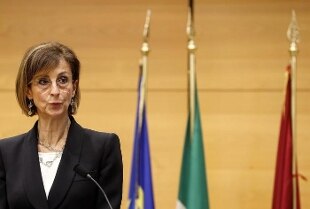Justice, Cartabia: civil process reform to relaunch the country
Justice, Cartabia: "Urgent reforms to restore credibility to robes"
Reform of Justice, Cartabia: "The Government plays the Recovery on the duration of the trials"
Justice.
Cartabia: "Reforms also in terms of taxation"
Share
by Tiziana Di Giovannandrea
18 June 2021 For the justice system "the reforms will help, but will not be decisive if they are not accompanied by a renewal of customs, by everyone, on a personal level and by the entire category", said the minister of Justice, Marta Cartabia, on the occasion of the 'Beati i Giusti' conference organized by the ANM on judge Rosario Livatino, victim of an ambush by the stidda on 21 September 1990 in Agrigento.
"We can - he added - change the organization and electoral systems of the self-governing body; we can change the rules for appointments and strengthen all possible incompatibilities and prohibitions; we can review the mechanisms of disciplinary judgments: we can discuss any possible reform - and we are doing it. And we will do it. - But all this, we must be aware of it, can at the most help to combat pathologies, but no legislative framework, however innovative and radical, can in itself generate that style and stature that citizens expect from the judge ".
In the particular moment that the judiciary is experiencing, the figure of the judge, killed at the age of 38, was indicated as a model to be followed by the Keeper of the Seals because Rosario Livatino was "a 'timeless model' of a magistrate" towards whom "look up . Today more than ever "said" a man who left a moral will, which reread today becomes a trace from which to start again, to return to being above all 'credible', in the eyes of that people, in whose name justice is administered ".
"Discipline and honor", "
independence and impartiality
"requires the Constitution" underlined Cartabia, who recalled the teaching and the words of Livatino: "The independence of the judge is not only in his own conscience, in his incessant moral freedom, in fidelity to principles, in his capacity for sacrifice, in his technical knowledge, in his experience, in the clarity and linearity of his decisions; but the independence of the judge - wrote Rosario Livatino - also resides in his morality, in the transparency of his conduct even outside the walls of his office, in the normality of his relationships and his manifestations in social life, in the choice of his friendships, in his unavailability to initiatives and business: still permitted but risky. And in the renunciation of any desire for offices and prebends,especially in sectors that can produce the germ of contamination and the danger of interference. "In the current season, Cartabia continued, there is a" profound crisis in the judiciary "and a" worrying tear in the relationship of trust with citizens ".
Cartabia underlined how Livatino was a '
magistrate worthy
' of the toga he wore: "The oath was not a mere rite for him, nor an empty formal fulfillment. He lived it as a solemn commitment, before himself, God, and all the Italian Republic which called him to carry out the public functions entrusted to him with 'discipline and honor', as required by art. 54 of the Constitution. A provision too often ignored, forgotten, neglected: 'The citizens to whom public functions are entrusted have the duty to fulfill them with discipline and honor, taking an oath. ”
Discipline and honor
: in profession and in life. The dominant concern in him, day by day, hour by hour, was that of 'being worthy' of the very delicate function of judging that he had accepted to perform.
Worthy to judge
: 'to judge not to condemn but to redeem', as Pope Francis recalled on the occasion of his recent beatification. Worthy to judge: in the relentless search to combine firmness and humility. Deep, authentic humility. Worthy of judging, with independence and impartiality, because 'the independence of the judge - said Livatino - is in the credibility that the judge manages to win in the travail of his decisions and in every moment of his activity ", concluded Cartabia.

